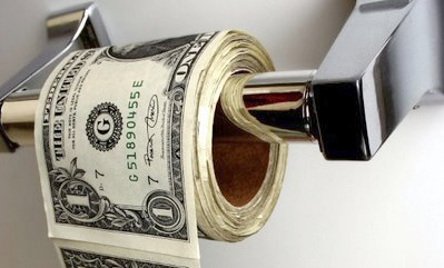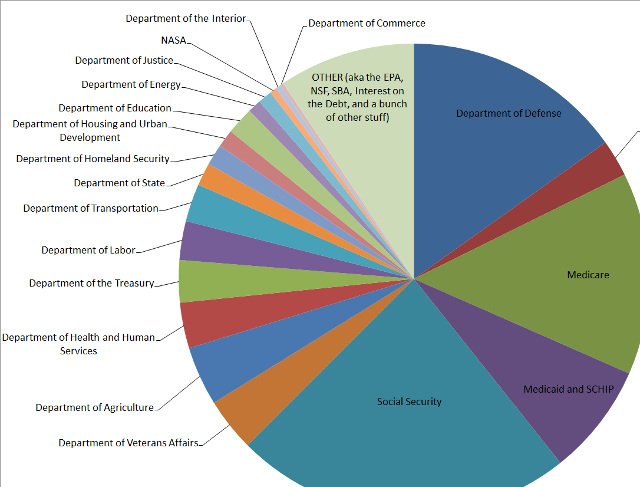"Government": Always a Bad Deal

(Note: To regular readers of my stuff, fear not; while this article starts out sounding like an economics lecture, it quickly becomes an anarchist diatribe.)
If you wanted to start a business making and selling bread, about how much would it cost you to produce it, and what could you sell it for and still make a profit? To try to answer this question you could take the complicated route, and start figuring out start-up costs, how much capital you would need to purchase equipment and supplies, cover expenses related to licenses and compliance with regulations, and so on. Or you could cheat by “peeking at the answers” in the bread aisle at the local grocery store. Assuming you’re competent enough to compete, you would probably end up charging about the same as other producers of bread do, which would probably be a bit above what it costs to produce it.

Unless you have some special knowledge or experience in some industry, how would you know what equipment is needed to produce a certain product, how expensive the equipment is, how labor-intensive the process is, what the needed raw materials cost, and so on? There are so many variables and unknowns that the average person can do little more than make a wild guess.
Or you could just go shopping.
If several different, competing companies produce a certain kind of product, it’s a safe bet that the costs of producing that product are less than what they sell it for, but not a whole lot less. After all, if it could be produced for a lot less than the usual price, someone else would be doing it, selling it for less, and making millions of dollars in the process.

However, without a relatively free market and competition, normal people have almost no way to know what any product “should” cost. For example, if some new electronic gadget comes out with a price tag of $199, but only one business is allowed to make it, and the manufacturing process is a complete mystery, how would you know if that price is at all reasonable? If you don’t know what goes into it, or even how it’s made, how can you tell if it costs $1 to produce, or $150 to produce? If there is an enforced monopoly, your choices are to either buy it at whatever price the one producer decides, or to not have one. If you have no choice in the matter, you may never know whether you’re getting a good deal or not.
And that is always true of everything that “government” does.
(Congrats on making it to the anarchist diatribe. Read on.)
When the average, well-trained statist says, “I’m proud to pay my taxes, because I like to have roads!” they are demonstrating not only a serious degree of Stockholm Syndrome (it’s pretty stupid to be “proud” of being forced to buy a product, even if the product is good), but they are also demonstrating profound economic ignorance. See if you can find the sliver in this image that represents the federal department of transportation.

Of that, a bit more than half has anything to do with highways. So about 1% of federal spending has anything to do with “muh roads.” So if the roads are why you like taxes, you should ask for an immediate 99% tax cut … for starters. Because, of what the feds do spend on roads, how can you tell how well the money is being spent? Do you actually have any idea exactly what construction and repairs are being done, and how much they should cost—how much they would cost in an actually free market? Unlikely. You, and other Americans, are forced to fund the whole thing, whether you like those “services” or not, and you don’t see or hear about what was actually accomplished. You hear the news talk about a federal budget of this many zillion gajillion dollars for this or that department, but do you ever bother to break it down to find out: a) how much you paid for that, and; b) what you actually got for it?
Most of us have heard the stories of boondoggles and ridiculous pork barrel projects, and things like the feds paying $100 for a hammer. But there is a complete and total disconnect between the money they steal from your paycheck, and where it actually goes, what it pays for, or why the hell it would cost what it does. Even at the local level, some resident might gleefully declare, “Well sure, they took a bunch of my money, but now we have a nice little park for my kids to play in!” Swell. But if you don’t know how many people were forced to fund it, and what the total was, you have no way to know what kind of a deal you got. If I was allowed to forcibly rob my nearest thousand neighbors of $1,000 each (and if I was evil enough to want to do such a thing), I bet I could make a pretty nifty park, too … and keep the leftover $950,000 for myself.

As a real-world example, yesterday morning I had the displeasure of seeing a stupid little one-page handout created by the local gang of parasites where I live, bragging about how they had spent stolen loot on various things. They beamed about spending $1,600,000 to convert old, unused railroad tracks into a place to walk. (If you think that old, unused railroad tracks already are a place to walk, join the club.) As best I can tell looking at the map, only about a mile of those old tracks are even in the township. A little math therefore seems to indicate that the township spent around $300 per foot to convert a flat place with railroad tracks on it, to … a flat place without railroad tracks on it. And no, it’s not paved. Just graded crushed stone.

Three hundred dollars per foot. Hey, me and my sledgehammer, shovel, and iron rake could have done that for a tenth of that price ($30 a foot), and still made a killing. But the township bragged about it in their flier, as if people should be thrilled at having been forced to pay for an insanely inefficient (not to mention entirely unnecessary) project. Sadly, a bunch of people probably are happy about it, because they didn’t bother to take the five minutes to figure out what a crappy deal they got.
And that’s a small, local “government,” doing a project right out in the open. The deals get exponentially worse when it comes to giant federal projects, where the details are unseen and unknown by normal people. And there are a ridiculous number of them. However, the most absurd has to be when the Pentagon spends trillions of dollars—as in multiples of $1,000,000,000,000—on things that are apparently so important that “taxpayers” aren’t even allowed to know anything about them. How well would that sales pitch work in an actually free economy?
“Act now! For only a few thousand dollars from every man, woman and child in the country, I will ……. um ….. do … something! You’ll never know what! But you don’t really need to know. Just trust me, it’s good, and important, and a really great deal! … Oh, and if you try to not fund this, we will send men with guns to kidnap you and put you in a cage. … So act now!”

When that is how “government” functions, and people still talk about how they don’t trust “the market” (i.e., people being able to choose when and how to spend their own damn money), well, that’s just an indication of how efficiently the “education” system is making gullible, obedient morons.
And that reminds me: if you’re a property owner, take a look at your “school tax” bill, and see how much you are being forced to fund the creation of a population of dimwitted, duped slaves. You will find that you’re not even getting a good deal on training people to be stupid subjects. They can’t even crank out mindless drones in a remotely cost effective way. But hey, apparently they don’t have to. Just make the subject class dumb as concrete, and then they won’t even notice how badly they’re being robbed, or what a damn rip-off scam “government” always is.

Such a great line. Thanks for continuing to post your great content here, Larken. For some reason (???) Facebook hasn't been showing me your posts in my feed. I've been manually seeking them out myself. Actually, I think I'll go adjust my settings right now to ensure your posts show at the top of my feed as I did with Futurism. Hopefully they won't charge me in the future as a user to do that.
Steem on.
This is an excellent post. At the time of this comment. 21 hours old, value - 210.50 and 360 views. 267 votes. Nicely done, Nicely done. This adds value.
There is a good argument by The Bad Quaker that anarchists should take advantage of every opportunity to take from "government." If someone finds a way to sell a hammer to the "government" for $1000, they should not hesitate to act. The logic is to bleed "government" and expose it for the immoral, inefficient "thing" it is. He argues that it is not a violation of NAP, since "government" does not legitimately own anything.
Yeah, it's impossible to "steal from the government," since (like you said) it doesn't rightfully own anything. However, it still could be viewed as accepting property that was stolen from others. Then again, letting the parasites keep it is even worse.
I like Ben Stone but the idea of bleeding government doesn't work out. More expenses only gives rise to more justification for more taxation and more government etc. It's a vicious cycle.
I just laugh when statists tell me taxes are the price we pay for essential government services. But that would imply that in taking your money, the government is obligated to offer a value greater than what you're giving up, otherwise, in a free market, you would be free to refuse to buy and see if you can get better somewhere else. And if you did buy it, and were not satisfied with it, you should get a refund. Ever tried that with government?
The government doesn't exchange value for value like companies do on the free market. It just takes whatever it wants and returns whatever it feels like, whether you like it or not and it'll always be more expensive than the market. The only reason you might think otherwise, is that some people are forced to pay for it.
Medical care is too important to leave up to greedy capitalists, don't you know a bag of saline solution costs $800?
It only costs $800 when there is no competition due to government regulations. Perhaps you were being sarcastic.
I think he was being sarcastic. But yeah, I was just about to say that too many people blame "freedom" for the ridiculous stuff that "government"-enforced monopolies create. Apparently they think that what we have now is actually a free market. Aak.
I only know of two ways a monopoly can actually exist for long.
It is sad how many people bash the market without realizing the thing they are actually angry about wouldn't exist in a free market. It requires government interference.
EDIT: And yes I posted on the wrong account and did not respond to you in some poetic prose. This is an out of character moment.
How exactly free market prevents monopolies? Hypothetically, if there are two competing companies doing the same thing, big enough to make smaller competitors remain insignificant, they can reach agreement to keep prices high (but not high enough for the small competition to be able to use it), forming "unofficial monopoly". What then?
Small companies my not be able to compete head-to-head, but without government barriers to entry small companies still have options. They can operate on the margins, offering services and serving customers in ways that big companies are unable or unwilling to. They grow, slowly gain market share, and then are more able to compete. This isn't an overnight kinda thing. It takes time and diligence to build a success.
You're pretty damn great too, Larken. I read 'Most dangerous superstition' straight after watching, 'Free to choose' by Milton Friedman. You finished what he started.
While I have your attention though, Dan. Thankyou so much for this place. It really means a lot to me.
Thank you for making it what it is with your participation. Steem is nothing without the masses of people like you.
I hope to continue to improve things in my continuing mission to seek out new life and new civilizations, to boldly go where no market has gone before.
Haha! That one gave me a nice chuckle!
The bag costs the end user $800, mostly because of govern-cement regulations.
Also due to the way insurance works. (again, because of govern-cement regulations)
Add to that the malpractice insurance (again, because govern-cement got in the way of doing things in an appropriate way)
And, there is the costs involved in actually producing extremely pure water and salt, packing and shipping it with no chance of contamination.
It isn't that hard to produce ultra pure water, just have to have an air tight completely sterile processing plant.
Ever wash salt?
Now enter the govern-cement. The amount of regulations requires a full time, very expensive, chemical engineer to administer the regulations. Then add a few secretaries to process the regulations and one lawyer to put their stamp of approval that the regulations were read properly. And none of this make the process any better. None of these people are actually involved in quality control.
Half of your hospital bill is malpractice insurance. This is caused by the way the lawyers (those who tell the govern-cement how to do) have made the legal system. Court cases are soooo costly that settling out of court for hundreds of thousands is cheaper. And those million dollar settlements are only the tip of the iceberg of what it actually costs. Just think, if we had a doctor system where it was, if we break it, we will do our best to fix it. Medicine is practice. There is no monetary value that will make it avoid incidence nor is money a replacement for life.
Then there is the poor hospitals. Say the saline actually cost $400, but you know, from experience, the insurance company will under pay you. So, you tell the insurance company it cost $800, so that you may in fact get your $400. This entire process is wrong, but it is the result of regulations. If the insurance industry was actually held to real standards, then these shenanigans would never be allowed to happen. But, now, these shenanigans are codified.
And last, hospitals cannot be built too close to each other. Because of govern-cement regulations. Thus, you have an area that really needs three hospitals. Well, it has to do with the one. And thus, there is no real competition, and certain hospitals are so busy, that even with a life threatening, minutes to live situation you are still waiting for hours in the emergency receiving room.
Beautifully well put. Thankyou.
Well said. Not to mention the Affordable Healthcare Act was predominantly written by the insurance industry.
This is awesome. I have friends in the econ dept who love arguing with me about "public goods" being necessarily funded by confiscation and violence (they say "taxation"); always supported with some anecdote or one-sided theoretical argument.
the costs of the violent confiscation, inefficiencies, lost opportunities, agency issues, and just bad morality it bestows on our society to enable things like industrial scale slaughter are never part of those calculations...no one ever says "murdering 3 million Vietnamese, or the Holocaust, were just fine because i love me roads, free surgery after a lifetime of letting my body go, and assaulting people who smoke weeds" but it's that type of extreme chaos that is made possible with blanket taxation.
Yeah but you cannot consider taxation to be violent confiscation if the people have consented to it. Obama didn't lie about the Affordable Care Act, for example, and even if you strongly disagree with it he was clear in his election promise and won. Similarly, when Trump cuts taxes, left-leaners may complain that it is the wrong thing to do but they cannot claim it to be against their will since he won the election. Certainly, people aren't always aware of reality and that may be a bigger issue, but the people consented to be taxed therefore it's a trade not confiscation. Unfair, perhaps, but a trade nonetheless.
eh, few alive today consented to anything. Just living in the U.S. doesn't mean you consent to everything the government does or demands; it just means you tolerate the bundle more than uprooting your home, leaving everything behind, and going to some other country with a different set of bundled rules that generally tend to be more inhibiting.
Real consent would be something along the lines of providing a choice of service offerings and allowing people to make their own value judgements of what they want to purchase. Bundling things and saying we have the choice between one of two bundles is not actual choice, nor is the decision to remain in our homes and not flee the country indication of consent.
I hereby declare that by living on Earth, you are "consenting" to give me half of your money. <-- That is no more ridiculous than the "social contract" BS that people use to try to make having a violent, parasitic ruling class seem legitimate. (And no, letting people choose between two nearly identical slavemasters is not the same as people being free.)
All I wanna know is where I can get one of those rolls of toilet paper.
You can have as many rolls of debt notes as you like. I'll keep my #bitcoin & #steem. :)
That roll was taped together by the photographer to get that image.
A roll of joke $100 toilet paper
https://www.amazon.com/dp/B00LGZIULO
Nice read with my coffee this morning, thank you.
No entity knows how to squander our tax dollars like the US government, an argument I often take up when debating with friends who's political views come packaged with big, bloated government. The school tax is a joke in regards to return on investment(quality of education), we opted to pony up and send our children to private school instead.
Keep in mind, you're ALSO still "ponying up" for the state indoctrination camps that you don't want and don't use.
I know, it's the kick in the shorts knowing I'm investing(haha) in every year after financially sacrificing so much as a family to give my children the best education I can afford and find in my area.
I know this is a little bit off topic, but to answer your first questions.
You want to bake bread? Well start a little speciality bakery.
There is a lot of profit in selling bread. The trouble is selling it.
If you want to sell it in the store... I hope you know someone.
I doubt most stores would even work with a new supplier.
And if they do, be prepared to pay for the shelf space.
--Its a big club, and you aren't in it.
For another example, how much does a toaster cost?
Well, at Wallymart, it costs $19.99. At a fancy store $199.99.
How much does it cost to produce? About $2 to $13.
There is very little material difference and almost no labor difference between the low end and high end toaster.
Things are priced at what the consumer thinks is the correct price.
The market is just so hard to enter, you might as well not try.
If you want to sell actual things, you will need to build the entire vertical. From just after raw materials all the way to customer satisfaction.